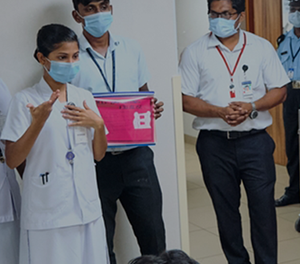

The Department of Dermatology, Venereology and Leprosy, which has been functioning since 1949, celebrated its 70th anniversary as well as its 40th year of post-graduate training in 2019.
The department offers out-patient and in-patient care for all diseases affecting the skin and mucosae, and systemic diseases with skin manifestations. The days and timings for the special clinics are given below. Sexually transmitted diseases are managed in the general and Infectious disease clinic.
The Out-patient clinic caters to 55,000 patients and 700 patients are treated as in-patients in a year. The outpatient clinic is in the second floor of the out-patient block. The laboratory is ably staffed by Ms. Sheeba Tennyson and Mr. Lazarus with results available the same day to expedite the management of patients. On the other wing of 2nd floor of the main block are the dermatology offices, library and classroom. Mrs. Linda Robert and Mrs. Nithyavani provide the secretarial help. The patients are counselled regarding chronic diseases by Mr. Nawab Nathan. The general dermatology ward is the O3 West ward which is spacious for patients. AC single and semi private rooms are in A block and non AC semi private and private rooms in O4, O5 and O6 wards.
The following are the treatment modalities offered for the dermatological conditions:
• Phototherapy for psoriasis, eczema, vitiligo, atopic dermatitis
• Intralesional steroid for Lichen planus, keloids, alopecia areata
• Wet wrap therapy for atopic dermatitis and chronic eczema
• Suction blister and minipunch grafting, punch hair transplant for vitiligo
• Electrocautery, radiosurgery and cryosurgery for warts, tumours and moles
• CO2 laser therapy for warts, tumours, xanthelasma and acne scar resurfacing
• Iontophoresis, botox injecjtions for palmoplantar hyperhidrosis
• Chemical peeling (salicylic and glycolic peels) & CO2 laser for pigmentation of face and acne scars
• Nd Yag Laser for hair removal and photorejuvenation
• Nail splinting and removal for ingrowing nail and dystrophic nails
• DNCB and DPCP applications for alopecia areata
Undergraduate medical training:
Duration of posting :
6 weeks ( in 3 sessions, 2 weeks each, during their clinical years)
Aim: At the end of their posting students should be able to recognize and treat common skin conditions
Didactic theory lectures are taken by the faculty on the following topics:
1. Introduction to Hansen’s disease, history taking and examination in leprosy
2. Approach to history taking and examination in Dermatology
3. Introduction to sexually transmitted diseases, history taking and examination of an STD case
4. Cutaneous infections
5. Introduction to papulosquamous and eczematous skin disorders
6. Systemic diseases and skin
7. Reproductive tract infections
8. Structure and function of skin and genodermatoses
9. Leprosy I
10. Leprosy II
11. Infection of skin I (Bacterial and fungal)
12. Infection of skin I (Mycobacterial, Viral & parasites)
13. Gonorrhoea
14. Skin in allergic state
15. Syphilis
16. Non specific inflammatory conditions in skin (Papulosquamous)
17. Minor venereal Disease
18. Skin in Autoimmune State I
19. AIDS Skin manifestations
20. Skin in autoimmune State II (Connective tissue)
21. Syndromic management of STI
22. Structure and functions of skin, Ages of man and their dermatoses
Clinics in Dermatology- Dermatology OPD/ Dermatology Ward
1) OPD clinics visits
2) Structured Clinics by Faculty
3) Laboratory posting
4) Observations of common dermatology procedures
5) Bed-side clinics
Evaluation:
Theory-Written exam-MCQ pattern
Clinical Exam- OSCE
Undergraduate Prize in Dermatology
The Dr. Dara Anand Raj memorial prize in Dermatology & Leprosy was instituted for undergraduates (final year students)
M.D Postgraduate training:
Background: We have been running postgraduate courses in dermatology from 1977. The first DNB students were awarded their diplomas in 1978. The department was recognised for the Diploma Dermatology in 1979 and the MD Dermatology in 1983. It has been re- designated as DDVL and MD DVL course from 2003. The department currently takes in one student in DDVL and 3 students for the MD course. The course commences in April-May.
The dermatology training in CMC is an ‘inservice’ training. The training is comprehensive and robust; the emphasis is on holistic care taking into account the medical, social and economic dimensions of the disease. The trainees are exposed to a wide spectrum of cases from across India and the subcontinent and gain tremendous expertise in the management of dermatological diseases and also in cases of multisystem disease with skin problems. They are also trained in dermatosurgery and dermatology laboratory procedures. Their work is supervised by the faculty of the department. They are also allotted mentors to provide them with support both in the academic field and also on the personal front.
Postgraduate Curriculum and Training
The residency period for MD is 3 years for fresh graduates and 2 years for those who have a diploma in the subject. The Diploma training is for a period of 2 years.
Posting during the MD training
|
S.No |
First Year |
Second Year |
Final Year |
|
1 |
General Dermatology, Venereology and Leprosy |
General Dermatology, Venereology and Leprosy |
General Dermatology, Venereology and Leprosy |
|
2 |
Cosmetology, Leprosy, Infectious disease |
Cosmetology, Leprosy, Infectious disease |
Cosmetology, Leprosy, Infectious disease |
|
3 |
Dermatosurgery |
Dermatosurgery |
Dermatosurgery |
|
4 |
Dermatology Laboratory |
Dermatology Laboratory |
Dermatology Laboratory |
|
5 |
Dermatology Consultations for in-patients |
Dermatology Consultations |
Dermatology Consultations |
|
6 |
Dermatology emergencies- dermatology |
Dermatology emergencies- dermatology |
Dermatology emergencies- dermatology |
|
7 |
External rotation (MD trainees) Microbiology Department |
External postings (MD trainees) Institute of Venereology, Chennai – 2 weeks Dermatology departments in secondary |
Email us :
04162283649
Mon-Fri: 8 am to 4.30 pm
( Sat : 8 am to 12:30 pm)